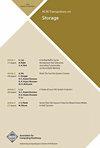Principled Schedulability Analysis for Distributed Storage Systems Using Thread Architecture Models
IF 2.6
3区 计算机科学
Q3 COMPUTER SCIENCE, HARDWARE & ARCHITECTURE
引用次数: 9
Abstract
In this article, we present an approach to systematically examine the schedulability of distributed storage systems, identify their scheduling problems, and enable effective scheduling in these systems. We use Thread Architecture Models (TAMs) to describe the behavior and interactions of different threads in a system, and show both how to construct TAMs for existing systems and utilize TAMs to identify critical scheduling problems. We specify three schedulability conditions that a schedulable TAM should satisfy: completeness, local enforceability, and independence; meeting these conditions enables a system to easily support different scheduling policies. We identify five common problems that prevent a system from satisfying the schedulability conditions, and show that these problems arise in existing systems such as HBase, Cassandra, MongoDB, and Riak, making it difficult or impossible to realize various scheduling disciplines. We demonstrate how to address these schedulability problems using both direct and indirect solutions, with different trade-offs. To show how to apply our approach to enable scheduling in realistic systems, we develop Tamed-HBase and Muzzled-HBase, sets of modifications to HBase that can realize the desired scheduling disciplines, including fairness and priority scheduling, even when presented with challenging workloads.基于线程架构模型的分布式存储系统可调度性分析
在本文中,我们提出了一种方法来系统地检查分布式存储系统的可调度性,识别它们的调度问题,并在这些系统中实现有效的调度。我们使用线程体系结构模型(TAM)来描述系统中不同线程的行为和交互,并展示如何为现有系统构建TAM,以及如何利用TAM来识别关键的调度问题。我们指定了可调度TAM应满足的三个可调度性条件:完整性、局部可执行性和独立性;满足这些条件使得系统能够容易地支持不同的调度策略。我们确定了阻碍系统满足可调度性条件的五个常见问题,并表明这些问题出现在现有的系统中,如HBase、Cassandra、MongoDB和Riak,使得实现各种调度规则变得困难或不可能。我们展示了如何使用直接和间接解决方案,通过不同的权衡来解决这些可调度性问题。为了展示如何在现实系统中应用我们的方法来实现调度,我们开发了Tamed HBase和Muzzled HBase,这两组对HBase的修改可以实现所需的调度原则,包括公平性和优先级调度,即使在面临具有挑战性的工作负载时也是如此。
本文章由计算机程序翻译,如有差异,请以英文原文为准。
求助全文
约1分钟内获得全文
求助全文
来源期刊

ACM Transactions on Storage
COMPUTER SCIENCE, HARDWARE & ARCHITECTURE-COMPUTER SCIENCE, SOFTWARE ENGINEERING
CiteScore
4.20
自引率
5.90%
发文量
33
审稿时长
>12 weeks
期刊介绍:
The ACM Transactions on Storage (TOS) is a new journal with an intent to publish original archival papers in the area of storage and closely related disciplines. Articles that appear in TOS will tend either to present new techniques and concepts or to report novel experiences and experiments with practical systems. Storage is a broad and multidisciplinary area that comprises of network protocols, resource management, data backup, replication, recovery, devices, security, and theory of data coding, densities, and low-power. Potential synergies among these fields are expected to open up new research directions.
 求助内容:
求助内容: 应助结果提醒方式:
应助结果提醒方式:


